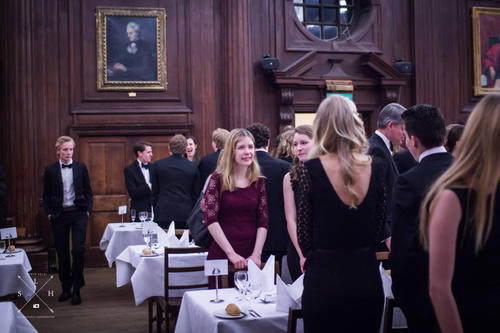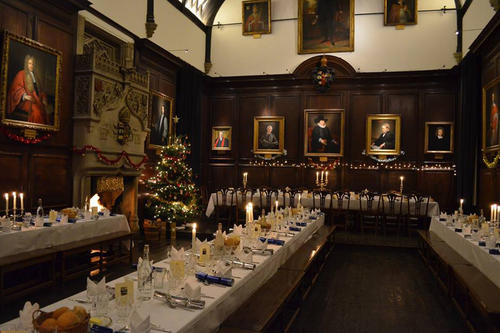Where Time Seems to Stand Still
Letter from the UK! In Oxford Helena Winterhager sometimes feels like she is back in the early 20th century.
Jan 14, 2016
Helena Winterhager at a dinner hosted by the Oxford Scandinavian Society at Somerville College.
Image Credit: Love Hedman
The tables are set: Christmas dinner in Lincoln Hall.
Image Credit: Private
The Oxford Christmas Market in December in the rain. A currywurst (sausage with curry sauce) costs a legendary 6 pounds (more than 8 euros) - so much for bargains!
Image Credit: Private
Shortly before Christmas as I was sitting in the bus on the way to London-Heathrow airport, I felt a bit melancholic. It was hard to leave Oxford, even though I would be returning from Berlin three weeks later. I was wondering whether I should have decided to stay in England to experience Christmas over here this one time.
Recently, while singing some cheerful, uplifting English Christmas carols at a college party, it became clear to me that Christmas in this country (as in the US or Scandinavia) is celebrated in a more fun-filled and light-hearted fashion compared to the more "contemplative" German way. With their melodies, songs like God Rest You Merry Gentlemen or The Twelve Days of Christmas convey a completely different feeling than, for example, the more sombre tone of the German classic Silent Night.
And on Boxing Day(the second day of Christmas in Germany), there is already business as usual again and bargain hunting with the post-Christmas sales, sports, and other events.
A Hint of the Class System
Still, even the English love things a bit sentimental at Christmas. This year, much notice was given to the last Christmas special of Downton Abbey, the long-running, highly successful series on ITV (Independent Television). Anyone watching this heart-rending series is transported back into the early 20th century, when England was a society rigidly separated into the upstairs dwelling aristocracy and the servants downstairs in the basement.
Watching the series one might think this was a portrait of the distant past. Yet studying in Oxford is in some ways reminiscent of those historical times and conditions. For example, I always feel a touch uncomfortable, when we students sit at dinner in our academic gowns and are served by people who are often our own age. And the fact that the student rooms are cleaned weekly by a crew of cleaners – in Oxford they are called scouts, in Cambridge bedders – is perceived by many non-British students as being a throwback, in a way, to an ancient class system.
Traditions Create a Special Flair
The university management at Oxford is trying to counteract this socially elitist image in favour of a modern, egalitarian one. Sometimes, however, the university's overzealous effort to promote diversity and political correctness produces curious results – for example recently, when hosting balls with themes based on the 1920s and the Jazz Era in New Orleans was criticised for allegedly glorifying historical periods in which gender and racial inequality prevailed.
Regardless of such debates, recent surveys have shown that the majority of students prefer to maintain the old traditions. Many of them are concerned that too many modern innovations would destroy the special atmosphere that gives Oxford its peculiar charm.
Those of us who have learned to love this unique ambience can understand their concern. For despite any ironic distance we might have in our mind, we love Oxford precisely because here, in some respects, time seems to stand still.



